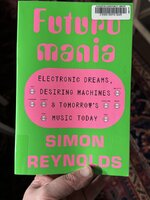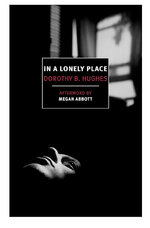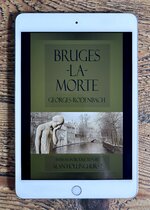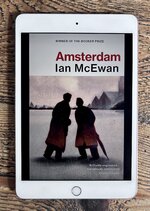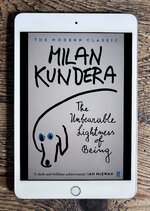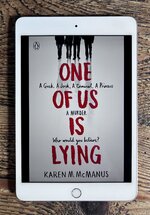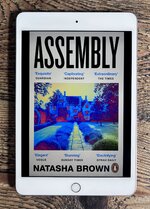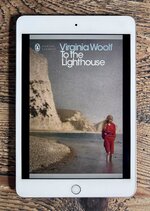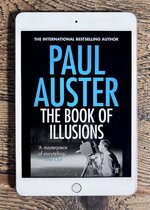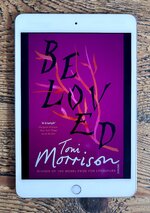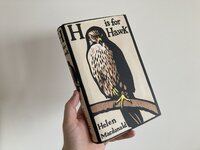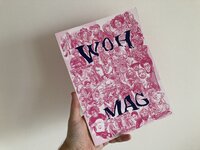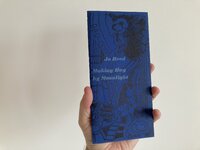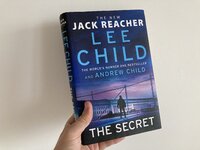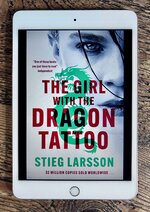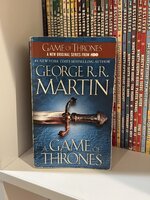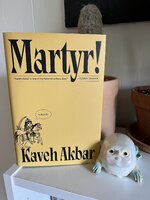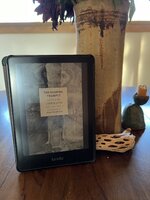August 2024
A bumper month with plenty of time on European train journeys followed by a few weeks finishing up the late shift at work allowing me extra time in the mornings to read. Nine completed, I'll be onto the tenth during today's commute but I don't think I'll finish that until next month so I'll add that then.
Book 43: Georges Rodenbach - Bruges-la-Morte
View attachment 212083
The first stop on our Euro rail trip was Bruges which was the only place I didn't already have a book based in so I bought this the day before we departed. A man mourns his young wife's death by moving to Bruges, a place that he sees as dying itself. Written and set in the late 19th century, very much before Bruges' transformation to a tourist hotspot, he describes in detail the decaying city despite spending much of his time in his own decaying house surrounded by the decaying belongings of his dead wife's. On a chance visit to the theatre, he sees a dancer that looks the double of his dead wife and he obsessively follows her and eventually courts her. As it becomes evident that the relationship is doomed he becomes more and more tormented by his loss and the story ends in tragedy. I know I enjoyed reading this but, even less than a month later I've found myself struggling to remember details despite the short length.
Book 44: Ian McEwan - Amsterdam
View attachment 212084
The main story is about two men, both former lovers of a woman whose funeral marks the start of the novel. They're at the top of their games as orchestral composer and newspaper editor until an unbeknownst witnessing to a serial rapist and a desire to ruin a politician over his cross-dressing tendencies provide the conflicts that threaten to tear apart their decades long relationship and end their respective careers in disgrace. Unlike Rodenbach's positioning of Bruges as a fully realised character within his book, McEwan only uses Amsterdam as a plot device to house a euthanasia pact between the old friends, (as far as I know assisted suicide is not legal in The Netherlands), and in fact the titular city is only visited towards the very end of the novel. It was a good read but, I feel like 1998 may have seen slim pickings in the world of literature because this didn't really feel 'great' in the way many Booker winners do.
Book 45: Jenny Erpenbeck - Kairos
View attachment 212085
I absolutely loved this 2024 winner of the International Booker Prize (written 2021). It tells of the increasingly toxic relationship between a young woman and her lover (30-odd years her senior) in the separated Germany of the late '60s and beyond. After she receives word in her present life in NYC that he has died, she looks through boxes of artifacts that aid her in telling the story of their affair. Erpenbeck's detailed East Berlin made me fascinated to learn more and made me love this half of the city as we walked around. This story of a naïve woman in her first love affair and an overbearing hypocritical womanizer was so well crafted, it's an absolute masterclass in writing people and places that feel every bit real.
Book 46: Milan Kundera - The Unbearable Lightness of Being
View attachment 212086
It was between a Kafka (probably The Castle) and this as we arrived in Prague. I'll get around to Kafka but, I'm glad I picked this. It was fitting following Kairos as it felt in many ways like a precursor to Erpenbeck's tale. Here, it's a freshly invaded Prague by Soviet tanks that provides the scene for a couple of complicated love affairs. I didn't find Kundera's characters quite as draped in realism as Erpenbeck's but, that wasn't necessarily a bad thing as it could have made a book about lightness feel tragically heavy. There's still a splash of sadness here but it's a sadness at feeling so attached to incredibly likeable characters when it just doesn't pan out for them. Kundera throws in paradoxical theological debates about whether God shits and casually cites philosophers from Socrates to Nietzsche so, I can see that the book may seem pretentious at times but, what the hell, I loved it.
Book 47: Karen M. McManus - One Of Us is Lying
View attachment 212087
Back home and I fancied something a little easier on the little grey cells and this has been in my pile for some time. I know it's a YA title but, I had an adult recommend it in favour of the Netflix adaptation and I have to say, I really did enjoy the sheer escapism of the plot. The writing isn't half bad and as a long time fan of the American teen movie, I enjoyed the clear references and it all felt nicely familiar. Nothing ground-breaking but, I definitely have time for that in my reading list. I went on to watch the TV show with my kid who had already seen it and boy, what a lot of changes they decided to make. I don't really understand why, it felt like 8 episodes had been requested and they just had to think of a way to (really) complicate the storyline. I didn't watch the second season as I may end up reading the subsequent books.
Book 48: Natasha Brown - Assembly
View attachment 212088
A short novel told from the viewpoint of a young, black woman in modern Britain. Her thoughts drift and in snippets, we learn of how she has lost her mum to cancer; is recently diagnosed herself but puts her work first for fear of losing everything she has worked twice as hard as her white counterparts to achieve; is frequently expected to take on subservient roles in the financial firm she works for; is told by colleagues that she has only been promoted because of her race. As she describes being born British of two British born parents but still feels that her passport is needed to confirm her nationality, it made me sad that people still feel this way in modern Britain but worse, not altogether surprised. The story culminates in a visit to her white boyfriend's family home for his parent's anniversary party. Aside from her race, the clash of her new money and their old wealth is apparent. It's a good book, though sparse and it feels like a subject that deserves a little more fleshing out. As a debut though, it's very confident and I'm interested to see what Brown offers next.
Book 49: Virginia Woolf - To the Lighthouse
View attachment 212089
More digestible than I found Mrs Dalloway but very much in the same trend, as limited narrative is given over to the meandering thoughts of characters, passing seamlessly from one to the next, as they ruminate about the potential to visit a lighthouse off the coast of Scotland the following day. Undoubtedly admirable as a work of art but, perhaps not my cup of tea for want of something more narrative driven.
Book 50: Paul Auster - The Book of Illusions
View attachment 212090
Definitely joint favourite, maybe even overall favourite of Auster's work so far for me. Narrated by a side character from his earlier work: Moon Palace, David Zimmer overcomes the mourning of his wife and children to a plane crash by finding light in 12 little known '20s silent movies featuring Hector Mann. In exploring the films, he discovers there's more to Mann than an immigrant slapstick comic. As the story progresses it felt in danger of succumbing to absurdity with the introduction of a girl and a gun but, whether this was Godard or DW Griffith Auster was channelling, he manages to use it as a device to transition the story into the next phase. Compelling throughout, an excellent piece of metafiction.
Book 51: Toni Morrison - Beloved
View attachment 212091
Truly haunting ghost story set in post civil war Cincinnati. The horrors of the period lend reasoning to the brutal killing of a child that returns initially as a malevolent spirit, then as a fully formed flesh and blood destructive seductress. Morrison's writing is sublime and it elevates the book into something truly unforgettable. In one sentence, she describes a matriarch urging a younger woman not to fall in love with her own baby so that she doesn't mourn too hard when they are sold, traded, tortured or killed. It's a heart-breaking depiction of the worst in humanity that should haunt the reader and remain in their thoughts. I cannot recommend this enough.
